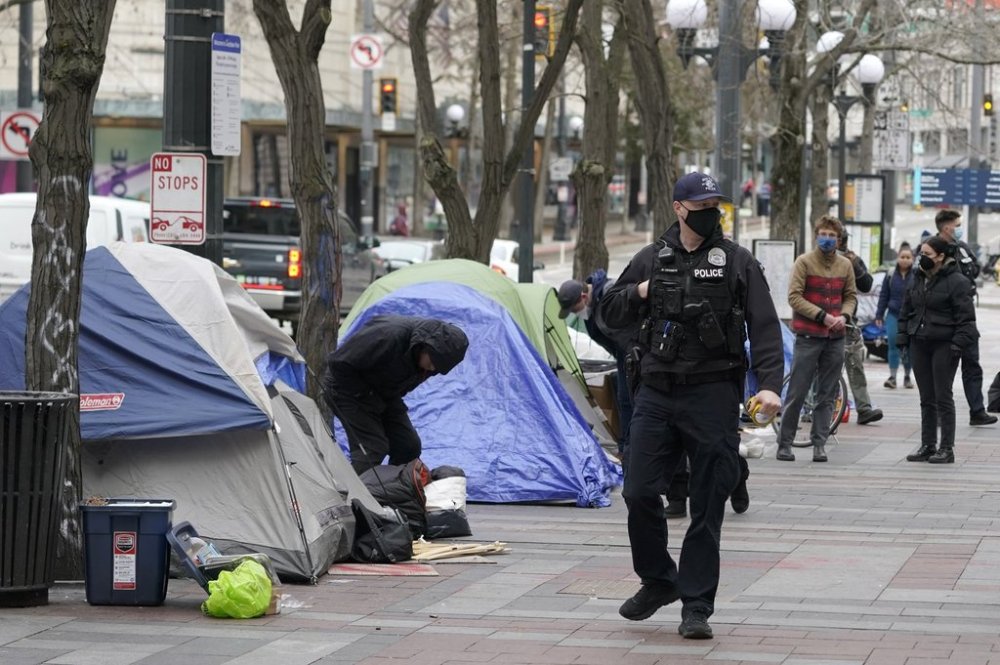Federal judge ends 13-year oversight of Seattle Police Department after use-of-force reforms
Advertisement
Read this article for free:
or
Already have an account? Log in here »
To continue reading, please subscribe:
Monthly Digital Subscription
$1 per week for 24 weeks*
- Enjoy unlimited reading on winnipegfreepress.com
- Read the E-Edition, our digital replica newspaper
- Access News Break, our award-winning app
- Play interactive puzzles
*Billed as $4.00 plus GST every four weeks. After 24 weeks, price increases to the regular rate of $19.00 plus GST every four weeks. Offer available to new and qualified returning subscribers only. Cancel any time.
Monthly Digital Subscription
$4.75/week*
- Enjoy unlimited reading on winnipegfreepress.com
- Read the E-Edition, our digital replica newspaper
- Access News Break, our award-winning app
- Play interactive puzzles
*Billed as $19 plus GST every four weeks. Cancel any time.
To continue reading, please subscribe:
Add Winnipeg Free Press access to your Brandon Sun subscription for only
$1 for the first 4 weeks*
*$1 will be added to your next bill. After your 4 weeks access is complete your rate will increase by $0.00 a X percent off the regular rate.
Read unlimited articles for free today:
or
Already have an account? Log in here »
SEATTLE (AP) — A federal judge returned full control of policing practices to the Seattle Police Department on Wednesday, after overseeing 13 years of reforms prompted by a U.S. Justice Department investigation that found the city’s officers were too quick to use force.
The city entered into a consent decree with the DOJ in 2012, under which it overhauled virtually every aspect of how the police department operated, including use of force, crisis intervention, police stops and detentions, crowd control, and the supervision of officers.
During a hearing Wednesday, Judge James Robart approved the city’s unopposed motion to terminate the consent decree. The ruling marks a new chapter for the department by giving it full autonomy over policing decisions.

In a statement, the DOJ described the development as “successful completion” of the consent decree. Teal Luthy Miller, the acting U.S. attorney in Seattle, said the reforms had “transformed the department into an example for other police forces.”
The DOJ launched the investigation in response to calls from the American Civil Liberties Union of Washington and other groups outraged over uses of force by officers.
Robart noted in his ruling Wednesday the most notable case, the fatal Aug. 30, 2010, shooting of Native American woodcarver John T. Williams. He crossed the street in front of a police cruiser while carrying a small knife. The officer ordered Williams to put down the knife, and shot him less than 5 seconds later.
“We are a much-improved department for going through this process,” Brian Maxey, the department’s chief operations officer, said in a written statement. “The Consent Decree created internal systems of ‘critical review’ for our employees – they know what they are doing and are accountable.”
Along the way, the department expanded training in de-escalation tactics, mandated body-worn cameras, and diverted certain 911 calls such as overdoses to involve civilian first responders.
Most federal oversight of the department ended in 2023, after Robart ruled the agency was in compliance with most of the agreement. The court retained jurisdiction over how the department handled crowd control, but in February, the city council passed a law setting new guidelines for its crowd-management practices, including restrictions on the use of blast balls, that satisfied the court and set the stage for ending the consent decree.

